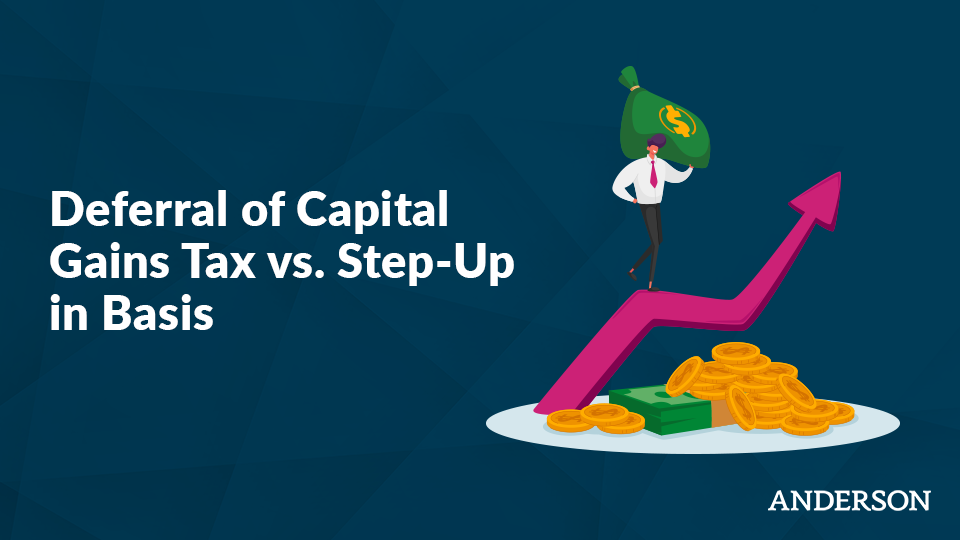
When part of an estate-planning strategy, a 1031 exchange can be a tax-smart method of bequeathing assets, as heirs typically receive a step-up in basis to the property’s fair market value as of the date of death. This can effectively eliminate the capital gains tax deferred through the 1031 exchange.
Key Takeaways
- You can defer your capital gains tax to increase and take full advantage of your purchasing power.
- A way to defer capital gains tax on real property is through a 1031 exchange. This entails reinvesting the proceeds from a property sale into purchasing a like-kind replacement property.
- Like-kind properties have the same nature, character, or class — qualities that most business and investment properties share.
Tax & Asset Protection Workshop
Learn about Real Estate & Asset Protection at our next
FREE LIVE STREAM
What Is Capital Gains Tax Deferral?
Capital gains tax deferral refers to the practice of delaying the payment of taxes on proceeds from the sale of assets, such as properties and other investments. With real estate investments, deferring your capital gains tax gives you an advantage by increasing your purchasing power. If you don’t owe tax immediately, you can put all the proceeds of a property sale toward another investment property type.
Deferring Capital Gains Tax With a 1031 Exchange
One of the ways you can defer capital gains tax in real estate is to conduct a 1031 exchange. In this process, you sell one property (the relinquished property) and roll over the proceeds into the purchase of another property (the replacement property). A third-party qualified intermediary holds the funds in escrow for you, so you never take receipt of the proceeds. The money remains within an investment, which isn’t taxable.
For a 1031 exchange to be valid, you must also meet certain conditions set forth by the Internal Revenue Service:
- The relinquished and replacement properties must be like-kind. That is, they must both be of “the same nature, character, or class.” Fortunately, because like-kindness has nothing to do with quality or grade, practically all real estate properties for business, trade, or investment purposes are like-kind to one another.
- The properties must be titled to the same taxpayer. In other words, the owner of the relinquished property and the purchaser of the replacement property must be the same person or entity.
- The properties must be within the United States. A foreign property isn’t like-kind to a domestic one.
- The value of the replacement property must match or exceed that of the relinquished property. In addition, you must reinvest all the proceeds from the sale of the relinquished property to avoid giving yourself a gift of tax-free cash.
- You must meet specific deadlines. From the time that you sell your relinquished property, you have 45 days to identify potential replacements. Then, you have 135 more days to purchase a replacement property and complete the exchange. The total time frame is 180 days.
If you satisfy the above requirements, you could use 1031 exchanges in perpetuity, continually trading up on properties and deferring the capital gains tax every time.
What Is Step-Up in Basis?
Step-up in basis, or stepped-up basis, refers to an increase in an inherited asset’s value compared to its original value at the time of purchase. In the investing arena, the term basis (or cost basis) means an asset’s original cost to the investor. That figure determines the amount of capital gain when the investor sells the asset at a profit and the capital gains tax they owe.
Upon the investor’s death and subsequent inheritance by their heirs, an asset’s basis steps up (increases) to reflect its current fair market value. So, if an investor purchased a rental home for $100,000 in 2000 and the property appreciates to $500,000 when the investor passes away in 2023, then the home’s cost basis would reset to $500,000 when ownership transfers to the heir.
Deferral of Capital Gains Tax vs. Step-Up in Basis: What’s the Connection?
To understand the connection between capital gains deferral and the step-up in basis, let’s revisit the investor who purchased the $100,000 rental home in 2000. However, this time, let’s say they acquired the property through a 1031 exchange and deferred the capital gains tax.
The capital gains deferral benefits the investor while they hold the 1031 exchange property. If the property remains profitable, they might hold on to it for the rest of their life, or they could conduct a 1031 exchange to swap it for another property that better aligns with their investment goals. If they continue to use the 1031 exchange provision in either manner, they could feasibly defer capital gains tax until death. According to the current tax laws, death would erase the capital gains tax due.
Upon the investor’s death, ownership of the property transfers to a named heir. The cost basis then steps up to reflect the current fair market value of the property, which is $500,000. If the heir sells the property for exactly $500,000, they owe no capital gains tax because they technically realized no gain. There’s also no capital gains tax “left over” from their benefactor since the tax liability doesn’t transfer.
A new capital gains tax doesn’t apply until the heir sells the property for a profit. Even then, the taxable amount would be the difference only between the sale price and $500,000.
Plan Your Estate With Anderson Advisors
Estate planning is one of the many financial services we offer at Anderson Advisors. Whether you’re looking to avoid capital gains tax on real estate, optimize wealth transfer to your heirs, or realize any other kind of estate goal, our expert advisors can provide you with the guidance you need. Call 800-706-4741 or complete our online form today to schedule your complimentary 45-minute estate planning strategy session.
Protect Your Legacy for Your Family
Schedule your free, 45-minute estate planning strategy session and learn how to ensure your family avoids probate and receives your assets and property.














